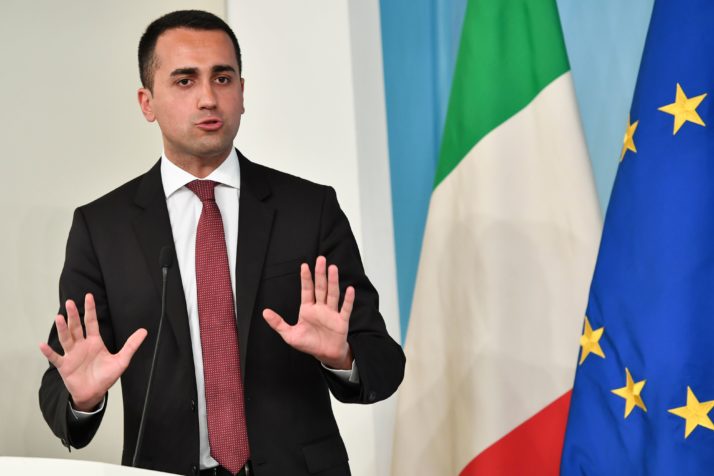The raft of investment deals that Italy’s leadership has just signed with Beijing as part of its massive Belt and Road program is “nothing to worry about,” Italian Deputy Prime Minister Luigi Di Maio said in an effort to reassure US.
“We are maximizing all precautionary measures, and I want to tell the U.S., and I will tell them as well in next week’s visit, that they are our allies, and that we understand their concerns. But the contents of the MOU (memorandum of understanding) that we are signing tomorrow contains nothing for them to worry about, nothing relating to 5G or any agreement on strategic telecommunications,” Di Maio added
Italy on Saturday became the first European Union and Group of 7 country to join China’s expansive Belt and Road Initiative (BRI), drawing concern from the U.S. and European allies.
Chinese President Xi Jinping’s visit to Rome saw a total of 29 deals signed, altogether worth 2.5 billion euros ($2.8 billion). They were focused on agricultural, finance and energy sectors, and opened up new access to the Chinese market for major Italian energy and engineering firms.
Western critics warn of Chinese debt traps and describe the initiative as a ploy to expand geopolitical and strategic influence, while Beijing pursues links to Europe and Africa via South Asia and the Middle East to expedite and increase the export of Chinese goods.
China and the U.S. are in the process of negotiations to end their protracted trade war, while Washington tries to combat what it sees as a security threat posed by Chinese telecommunications companies, particularly its largest, Huawei. The U.S. says Huawei’s role in building 5G internet infrastructure around the world could allow the Chinese government to spy on users, a claim Beijing rejects.
Italy reassure US after becoming 1st EU country to join China’s Belt and Road initiative
The raft of investment deals that Italy’s leadership has just signed with Beijing as part of its massive Belt and Road program is “nothing to worry about,” Italian Deputy Prime Minister Luigi Di Maio said in an effort to reassure US.
“We are maximizing all precautionary measures, and I want to tell the U.S., and I will tell them as well in next week’s visit, that they are our allies, and that we understand their concerns. But the contents of the MOU (memorandum of understanding) that we are signing tomorrow contains nothing for them to worry about, nothing relating to 5G or any agreement on strategic telecommunications,” Di Maio added
Di Maio, who also serves as minister of economic development and leader of the populist Five Star Movement, stressed that none of the deals discussed over the weekend involved 5G or telecommunications.
“On the doubts of the U.S. — who remain our allies, and with whom we remain aligned in the West, in NATO and in the EU — these doubts are more than understandable, and were part of the discussions we have had with the U.S. government, in relation to their 5G concerns,” he said.
“5G is a strategic infrastructure that we are developing in our country. There are some concerns over the security of these telecommunications — and these are concerns that we share, and which we are addressing with new regulations on the ‘golden power’. These are more restrictive and allow us to control the players that will enter the 5G telecommunications market in the coming years.”
Italy’s ‘golden power’ legislation refers to government powers designed to protect strategic industries, which it says it plans to extend to 5G technologies. This would entail requiring Italian companies in both the private and public sectors to declare to the government any 5G technology purchased from non-European countries.
Italy’s economy fell into recession at the end of 2018, and the collapse of its Genoa Bridge last August drew attention to the dire state of its infrastructure. It has one of the highest levels of debt in the EU, and the audacious spending plans announced by its right-wing government after last year’s elections were pared back after disputes with the rest of the EU.
Still, the deputy prime minister dismissed notions that his government was aiming for greater Chinese purchases of Italian bonds, and focused on the benefits the deals would bring for Italian businesses.
“All the agreements that we are about to sign are based on the possibility of ‘Made in Italy’ to go to China, for our companies to export to China, after many years where ‘Made in China’ had been coming to Italy,” he said. “We are reversing the trend and rebalancing our trade flows — but there isn’t any intent on making any pacts on financial support relating to goods, to the Treasury, or to government bonds.”
“We are not looking to ask China for help with our government bonds,” he added. “Instead, we are looking to advance our own agenda and create more jobs in Italy by increasing our exports to China.”
Di Maio intends to further discuss the new links to China with his American counterparts when he visits Washington next week, he said.
Earlier this month, the official Twitter account of the U.S. National Security Council posted a tweet describing Italy as a major global economy, saying that “Endorsing BRI lends legitimacy to China’s predatory approach to investment and will bring no benefits to the Italian people.”
source: CNBC
